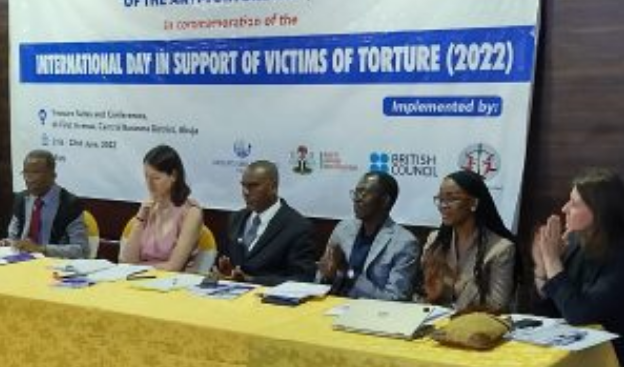Mrs Beatrice Jedy-Agba, the Solicitor-General of the Federation, says a confessional statement obtained during interrogation is not admissible by a trial court in a criminal trial.
Jedy-Agba, who is also the Permanent Secretary, Ministry of Justice, stated this on Tuesday in Abuja during the opening of a two-day technical consultations tagged: “Archiving Zero Tolerance for Toture” in Abuja.
Reports have it that the event, which was organised by Avocats Sans Frontiers (ASF) France and the Rule of Law and Anti-Corruption (RoLAC) Programme of the British Council, is in commemoration of this year’s International Day of Support for Victims of Torture.
The solicitor-general, therefore, warned against the use of torture during interrogation by security agents.
Jedy-Agba, represented by Mr Mohammed Abubakar, Director of Public Prosecution in the ministry, said: “It will therefore be necessary to make these points very clear to law enforcement agents.
”This is to drive home the point that the use of torture is unacceptable in any way in the administration of criminal justice.”
According to her, if anything, It renders a law enforcement agent susceptible to condemnation by the public or even prosecution for acting unlawfully.
“In this respect, it may be pointed out that the Police Act provides that a police personnel shall be personally held liable for any act committed by him which is beyond his authority,” she said.
She said as part of efforts to checkmate the menace in the country, the Anti-Torture Act 2017 was put in place to provide framework for combating the use of torture in extracting confession from suspects during investigation or as punishment for an offender during incarceration.
“The Convention Against Torture and other cruel, inhuman or degrading treatment or punishment (The Torture Convention) was adopted by the General Assembly of the United Nations on 10th December, 1987 after it had been ratified by 20 states.
“Nigeria is signatory to the UN Convention against Torture (UNCAT), having ratified same on the 28th of June, 2001,” she added.
The Country Director of ASF France, Angela Uzoma-Iwuchukwu, described toture as “one of the worst form of human right violation.”
Uzoma-Iwuchukwu, who said the act is not limited to security agencies alone, said it could occur anywhere whether physical or psychological.
“Victims of toture abound everywhere, in every part of this country because many Nigerians have been dehumanised physically or psychologically.
She said the country must step up effort to ensure that perpetrators of torture are held accountable.
“We will insist that without accountability, justice cannot be served,.
“This should translate to prosecution of security agents who have been found culpable of torture under the Anti-Torture Act,” she said.
The country director said that a definite part-way should be created to also ensure that victims of torture receive redress and compensation.
She, however, expressed concern that since the passage of the Anti-Torture Act, the implementation had not been encouraging.
The National Programme Manager of RoLAC, Danladi Plang, who said all hands must be on deck to ensuring that Nigeria is peaceful and accomodating, said all forms of violence promote torture.
“Violence in our homes promotes torture. We are not only talking about security agencies but also the non-state actors who torture others.
“We need to reclaim that society we used to know that we care for one another,” he said.
He recalled that the National Human Rights Commission (NHRC), in its 2020 Annual Report, said it received 12, 400 complaints of torture by individuals and about 73, 000 cases of other forms of torture, cruel, inhuman and degrading treatments.
Plang, who called for equal treatment of citizens, urged government to always make available resources to enable agencies saddled with the responsibility to end torture perform optimally.
NAN reports that the International Day of Support for Victims of Torture is celebrated June 26 of every year.

















Discussion about this post